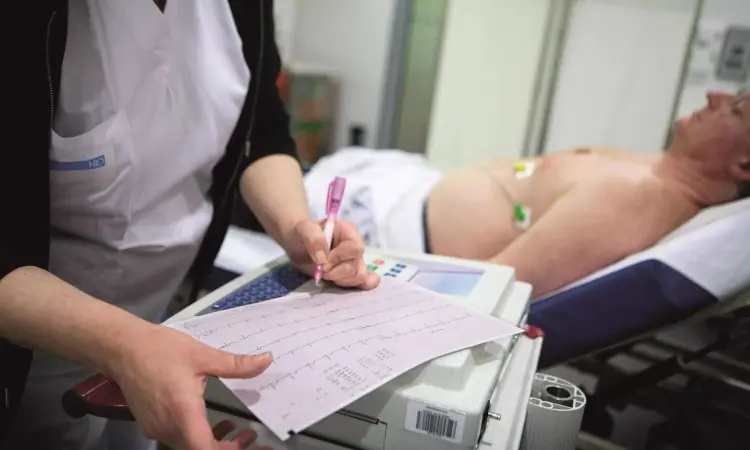- Home
- Medical news & Guidelines
- Anesthesiology
- Cardiology and CTVS
- Critical Care
- Dentistry
- Dermatology
- Diabetes and Endocrinology
- ENT
- Gastroenterology
- Medicine
- Nephrology
- Neurology
- Obstretics-Gynaecology
- Oncology
- Ophthalmology
- Orthopaedics
- Pediatrics-Neonatology
- Psychiatry
- Pulmonology
- Radiology
- Surgery
- Urology
- Laboratory Medicine
- Diet
- Nursing
- Paramedical
- Physiotherapy
- Health news
- Fact Check
- Bone Health Fact Check
- Brain Health Fact Check
- Cancer Related Fact Check
- Child Care Fact Check
- Dental and oral health fact check
- Diabetes and metabolic health fact check
- Diet and Nutrition Fact Check
- Eye and ENT Care Fact Check
- Fitness fact check
- Gut health fact check
- Heart health fact check
- Kidney health fact check
- Medical education fact check
- Men's health fact check
- Respiratory fact check
- Skin and hair care fact check
- Vaccine and Immunization fact check
- Women's health fact check
- AYUSH
- State News
- Andaman and Nicobar Islands
- Andhra Pradesh
- Arunachal Pradesh
- Assam
- Bihar
- Chandigarh
- Chattisgarh
- Dadra and Nagar Haveli
- Daman and Diu
- Delhi
- Goa
- Gujarat
- Haryana
- Himachal Pradesh
- Jammu & Kashmir
- Jharkhand
- Karnataka
- Kerala
- Ladakh
- Lakshadweep
- Madhya Pradesh
- Maharashtra
- Manipur
- Meghalaya
- Mizoram
- Nagaland
- Odisha
- Puducherry
- Punjab
- Rajasthan
- Sikkim
- Tamil Nadu
- Telangana
- Tripura
- Uttar Pradesh
- Uttrakhand
- West Bengal
- Medical Education
- Industry
Early PCSK9 Inhibitor Shows Positive Outcomes in Acute Coronary Syndrome Patients

A recent study published in the International Journal of Cardiology found compelling evidence supporting the early use of PCSK9 inhibitors in patients with Acute Coronary Syndrome (ACS). The study involved a systematic review of nine independent studies which encompassed 2896 ACS patients and focused on assessing safety and cardiovascular impacts.
This research utilized PubMed, Web of Science, and Embase databases and meticulously examined studies from inception to October 2023. Two independent research teams extracted data to assess bias risks in the included studies. This meta-analysis which was facilitated by STATA 16.0 software produced revelatory findings.
The early administration of PCSK9 inhibitors during hospitalization for ACS demonstrated a remarkable effectiveness in reducing Major Adverse Cardiovascular Events (MACEs) when compared to statin monotherapy. The findings revealed a decrease in coronary revascularization, recurrent ACS, readmissions due to unstable angina, and strokes.
The study also highlighted significant reductions in LDL-C, TG, and Non HDL-C levels in the short term. Also, HDL-C levels increased along with a surge in the individuals who meet with LDL-C compliance criteria. The use of PCSK9 inhibitors did not significantly elevate the risk of adverse drug events like, ALT increase, allergies, or musculoskeletal pain.
These findings suggest that the early use of PCSK9 inhibitors demonstrated a commendable safety profile and proved highly effective in reducing the incidence of critical cardiovascular events
Cardiologists and healthcare professionals globally are optimistic about the implications of this research which suggests a potential shift in the management of ACS patients. Further research and clinical trials are imperative to validate and expand upon these promising findings.
Reference:
Yifan, D., Yue, M. , Yubin, Z., Jiapei, G., Xu, S., Shenghu, H., Li, Z., & Jing, Z. (2024). The impact of early in-hospital use of PCSK9 inhibitors on cardiovascular outcomes in acute coronary syndrome patients: A systematic review and meta-analysis. In International Journal of Cardiology (p. 131775). Elsevier BV. https://doi.org/10.1016/j.ijcard.2024.131775
Neuroscience Masters graduate
Jacinthlyn Sylvia, a Neuroscience Master's graduate from Chennai has worked extensively in deciphering the neurobiology of cognition and motor control in aging. She also has spread-out exposure to Neurosurgery from her Bachelor’s. She is currently involved in active Neuro-Oncology research. She is an upcoming neuroscientist with a fiery passion for writing. Her news cover at Medical Dialogues feature recent discoveries and updates from the healthcare and biomedical research fields. She can be reached at editorial@medicaldialogues.in
Dr Kamal Kant Kohli-MBBS, DTCD- a chest specialist with more than 30 years of practice and a flair for writing clinical articles, Dr Kamal Kant Kohli joined Medical Dialogues as a Chief Editor of Medical News. Besides writing articles, as an editor, he proofreads and verifies all the medical content published on Medical Dialogues including those coming from journals, studies,medical conferences,guidelines etc. Email: drkohli@medicaldialogues.in. Contact no. 011-43720751


